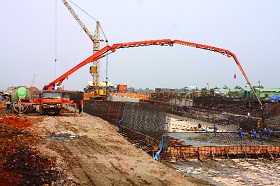PPP timeframe in sharp focus
The long preparation for public-private partnership framework is getting on foreign investors’ nerves. During the mid-term Vietnam Business Forum (VBF) held in late May in Hanoi, foreign investors urged the government to implement public-private partnership (PPP) pilot projects soon to pave the way for the private sector to invest in infrastructure projects.
 The PPP model is seen as a cure to Vietnam’s infrastructure shortcomings |
“PPP projects will be of key importance to upgrade Vietnam’s infrastructure as the country integrates further into the world economy,” said Duhn. The Ministry of Planning and Investment (MPI) late last year released new draft regulations on pilot infrastructure development PPP projects after years of preparation. These new regulations are designed to encourage more self-sustainable, viable and profitable infrastructure projects.
MPI Deputy Minister Dang Huy Dong said it took a long time to prepare framework for pilot PPP projects because it was a new investment form in Vietnam and the government had to learn from other countries’ experiences. However, he believed Prime Minister Nguyen Tan Dung could approve the PPP framework drafted by the MPI later this year.
Recently, the government selected Dau Giay-Phan Thiet expressway as the first PPP pilot project in Vietnam. The expressway is one of important transport infrastructure projects in southern Vietnam, connecting Ho Chi Minh City and Phan Thiet City in Binh Thuan province.
Though the government appointed Bitexco Group, a domestic private company, as an investor in the expressway, there was no specific timeline for construction. Tony Foster, head of the VBF’s Infrastructure Working Group, said pilot PPP projects’ implementation was important and urged the government to provide greater details on PPP regulations.
In a document sent to the MPI, Frasers Law Company suggested the MPI detail the risk allocation between state authorities and private investors. In addition to that, the law company also proposed that private investors should be encouraged to self-propose projects.
Under the MPI’s draft PPP regulations, the state authorities will mainly propose PPP projects. Also, the government can fund up to 30 per cent of required investments of a single PPP project, or even 50 per cent of a specific project with a longer operating period, higher cost recoveries, or poverty-relief orientations.
What the stars mean:
★ Poor ★ ★ Promising ★★★ Good ★★★★ Very good ★★★★★ Exceptional
 Tag:
Tag:
Related Contents
Latest News
More News
- Hermes joins Long Thanh cargo terminal development (February 04, 2026 | 15:59)
- SCG enhances production and distribution in Vietnam (February 04, 2026 | 08:00)
- UNIVACCO strengthens Asia expansion with Vietnam facility (February 03, 2026 | 08:00)
- Cai Mep Ha Port project wins approval with $1.95bn investment (February 02, 2026 | 16:17)
- Repositioning Vietnam in Asia’s manufacturing race (February 02, 2026 | 16:00)
- Manufacturing growth remains solid in early 2026 (February 02, 2026 | 15:28)
- Navigating venture capital trends across the continent (February 02, 2026 | 14:00)
- Motivations to achieve high growth (February 02, 2026 | 11:00)
- Capacity and regulations among British areas of expertise in IFCs (February 02, 2026 | 09:09)
- Transition underway in German investment across Vietnam (February 02, 2026 | 08:00)






















 Mobile Version
Mobile Version